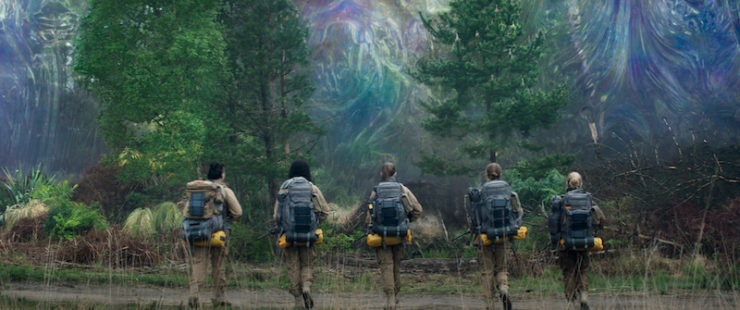I’m honestly not sure what to say about Annihilation. The best I can come up with is: what if the worst parts of Contact had a child with the best parts of Arrival, which then had a torrid affair with The Fountain? The resulting progeny might look a lot like Annihilation. Which is to say: the parts I loved I really loved, and the parts that didn’t work for me nearly jarred me right out of the film.
An attempt at a non spoiler review lurks below.
Annihilation is Alex Garland’s adaptation of the first novel of Jeff VanderMeer’s Southern Reach Trilogy: Annihilation, Authority, and Acceptance. I have only read the first novel so far, and loved it. It had a beautiful blend of Lovecraftian weirdness, Floridian weirdness, and ecological horror that exactly meshed with my own reading sensibilities. Everyone go read the book!
This adaptation is not even remotely faithful, but it does capture a lot of the tone, and the general feeling of uncanniness, much better than I expected any film to do. The book is very interior; there are lots of long scenes of people sitting still and thinking, freaking out about their situation, remembering past tragedies—it’s not terribly cinematic. But Garland makes the most of the visuals that hover between enchanting and terrifying.

The movie also adheres to the book’s basic plot. A mysterious event has struck an area in Florida that is now called “Area X.” The area—which is more or less St. Marks, in the Florida panhandle—has been enveloped in an entity the movie names “The Shimmer.”
The US government has sent team after team of soldiers in to investigate, and none have returned…until now. A soldier played by Oscar Isaac shows up in his house a year after his mission. He can’t remember where he’s been, or what happened to his unit. His wife, Lena (Natalie Portman), a biologist with a background in the military, decides to join the latest troop in order to understand what happened. The rest of the all-woman unit is made up of Ventress, a psychologist (Jennifer Jason Leigh), Radek, a physicist (Tessa Thompson), Thorensen, an EMT (Gina Rodriguez), and Sheppard (Tuva Novotny), an anthropologist.
Readers of the books will notice a change—there are only four team members in the book, and each of them is only known by their function: they are The Anthropologist, The Surveyor, The Biologist, and The Psychologist. The Biologist is only ever The Biologist, and while we learn about her past and her tangled emotions, we still experience her, and the rest of the team, as their functions before anything else. This had a flattening effect in the book that added to the feeling of being unstuck in reality, and heightened the tension between the team fighting to maintain their old reality, and wanting to lose themselves in the mysteries of Area X. I doubt this would have translated well to film, so I’m pleased with the filmmakers’ decision to give the characters slightly more characterization.

Another change that book-lovers might appreciate knowing about is the absence of the tunnel/tower. While that sentence is probably meaningless to a lot of you, the tunnel/tower is a huge part of the book, and vitally important to its themes, and I think it’ll be helpful to those of you who have read the book if you know not to expect it. I know that my colleague Molly and I spent a lot of the screentime waiting for it to turn up. I’m not exactly disappointed by its absence, but I also think I would have settled in and focused on the film more if I hadn’t had that nagging question of when, or if, it would appear. This also necessarily changes the scientists’ relationship to Area X, because it becomes a bit less about communication, which is funny to me since the film reminded me more of Arrival than anything else. I turned it over in my mind a few times, and I think the connection to that film is in the way Annihilation deals with grief and guilt.
Where the book focuses on grief, and fuels much of its horror with that sense of melancholy, I would argue that the film focuses too much on guilt. This is one of the rare points where Annihilation falters when it comes to gender, because I felt that by focusing on Lena’s guilt as a motivator, the film undercuts her role as a scientist. Rather than plunging into the unknown to learn and make discoveries, she feels that she owes something to a person she loves—which is a completely different catalyst. It just strikes me as a little too easy to say, “Lena feels guilty, so she went to Area X.” The film gives each of the team a motivating impulse where the book leaves more to the reader’s imagination. (One woman is sick, one woman lost a daughter—as is apparently now required in all genre films—and one woman is an addict.)

In some ways the movie represents a huge leap forward. It gives us an all-female ensemble, an openly queer character, casual diversity, and, best of all, scientists who actually act like scientists. These aren’t the bumblers of Prometheus, trying to hug every horrifying monster they see—Lena observes nature, takes samples where she thinks they’ll be useful. Radek panics when she realizes her tech won’t help her in The Shimmer, but then recovers and uses old-fashioned powers of observation, and the willingness to suspend disbelief in the face of the fantastic, that make for an excellent physicist. Ventress both analyses the others and keeps a tight, tight lid on her own emotional tells, just like every psychologist I’ve ever known.
But even having said that, I’d say this film is more “feels-provoking” than “thought-provoking.” Many of the visuals, and particularly the more horrific elements, elicit a gut response, and even hours later I found myself in a fog of emotion, still not ready to move into the intellectual debate mode…as might be clear from this review. The ensemble is so fantastic, they make these roles work even when the script gets a little thin. Natalie Portman covers a huge range of emotion in this role, from flashbacks to happy beeps with Oscar Isaac to the grey, unmoored blankness of grief. Tessa Thompson is lovely in a role that is the polar opposite of the hard-drinking, hard-fighting, friend-of-Hulk Valkyrie, and Jennifer Jason Leigh is steely and brittle and weird, and absolutely perfect.

One thing the film gets perfectly right, surprisingly, is Florida. Florida’s hard to get right – after spending most of my life there, I still don’t feel like I always capture it. But this movie does, despite being shot largely in the UK. It’s based in a particular area of the state, St. Marks (just a short drive from Wakulla Springs), where swampland edges into coastline. The vegetation is cypress, pine, live oak, palmetto—beautiful plants that hide spiders and cockroaches. The wildlife are alligators, boars, bears, and deer. The lush beauty, the heat, the rot, the bone-deep knowledge that literally every animal, insect, and plant is trying to murder you, is infused into every moment of this film. But where it truly gets it right is that it isn’t just that people realize there are monsters in the water, or that the plants might be more than they seem—it’s that just as often the terror gives way to awe at the beauty of nature, and the ways The Shimmer has transformed it.
I must also note that this is a horror film. It’s being marketed as a sci-fi story—a team of scientists go into a strange territory to investigate the unknown. But it’s at least as much a body horror film, and please be aware that there are multiple, long scenes of graphic, drawn-out violence. There are also moments that recall Bryan Fuller’s Hannibal more than anything else. Personally, I was fine with it (sometimes more than fine) but be aware of your own needs. I enjoyed seeing it in the theater, but I noticed that the audience was having some of the most visceral reactions I’ve seen in a film in a long time. People gasped, hid their faces, shrieked, and I’d say about a dozen people fled over the course of the first hour. I found some of the horrific moments to be the most beautiful, and I didn’t ever think the film veered into shock for shock’s sake. I also want to say, without getting into spoilers, that the last half hour of the film…the phrase “batshit” doesn’t encompass just how insane the film gets. (Hence my mention of The Fountain in the opening paragraph.) I can’t imagine that we’ll see a film this year so committed to sheer unmoored beauty. Sometimes it’s indulgent, sometimes it’s ridiculous, but I doubt we’ll get another film quite like it.

Leah Schnelbach did not expect this film to make her homesick. Come tell her whether it’s a floor wax or a dessert topping on Twitter!










